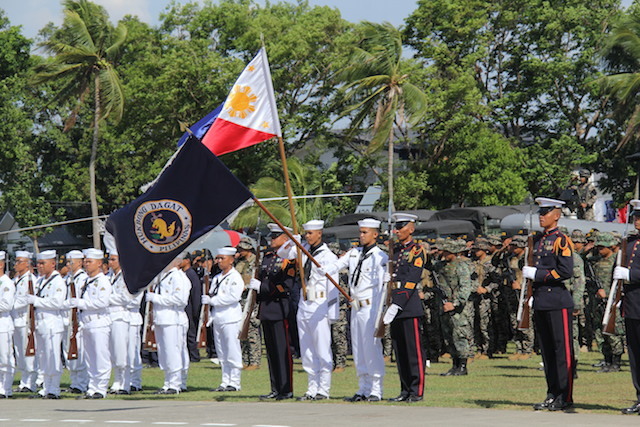From the Philippine News Agency (May 23):
Archipelagic Sea Lanes passed on 3rd reading
The House of Representatives has approved on final reading
HB 5487 or the proposed law providing the parameters for the establishment of
the archipelagic sea lanes in the country’s archipelagic waters.
HB 5487, which was passed on 3rd reading last Wednesday, is
entitled “An Act providing for the establishment of the Archipelagic Sea Lanes
in the Philippines Archipelagic waters, prescribing the rights and obligations
of foreign ships and aircraft exercising the right of Archipelagic Sea Lanes
passage.”
HB 5487, a substitute measure contained in Committee Report
No. 574, was defended and sponsored during plenary debates by, among others,
Committee on Foreign Affairs chairman Hon. Al Francis C. Bichara, himself one
of the principal authors of the original measure, HB 4888.
Archipelagic sea lane refers to the designated sea lanes and
air routes in the archipelagic waters through which foreign vessels or aircraft
may exercise the right of archipelagic sea lanes passage, while archipelagic
waters refers to the waters on the landward side of the archipelagic baselines
except as defined as Internal Waters.
It is noted that one of the key provisions emphasizes that
the exercise of the right of archipelagic sea lanes passage (ASLP) by all
foreign ships shall be consistent with the constitutional mandate of freedom
from nuclear weapons in Philippine territory.
While Archipelagic sea lane passage refers to the exercise
in accordance with the UNCLOS of the rights of navigation and overflight in the
normal mode solely for the purpose of continuous, expeditious and unobstructed
transit between one part of the high sea or an exclusive economic zone (EEZ)
and another part of the high sea or an EEZ. (UNCLOS – 1982 United Nations
Convention on the Law of the Sea)
Other principal authors of the measure are Reps. Francisco
Ashley L. Acedillo (Magdalo Party-list), Rep. Rodolfo G. Biazon (Lone District,
City of Muntinlupa), Rep. Jose F. Zubiri III (3rd District Bukidnon), and Rep.
Rufus B. Rodriguez (2nd District, Cagayan de Oro City), among others.
The proposed statute provides that the “State in the
exercise of its duty to protect its maritime domain shall implement and adhere
to the provisions of the 1982 United Nations Convention on the Law of the Sea
and relevant international conventions to which the Philippines is a party.”
It also provides for a comprehensive array of provisions
stating the rights and obligations of foreign ships and aircraft when
exercising the right of Archipelagic Sea Lane Passage.
The proposed Act mandates that the President shall
promulgate through Executive Issuances the archipelagic sea lanes which may be
used for the right of archipelagic sea lanes passage and the rules and
regulations relating to Associated Protective Measures to be prescribed, within
areas along the archipelagic sea lanes in accordance with the International
Maritimes Organization (IMO) Conventions and Regulations and other relevant
international agreements.
The National Coast Watch System (NCWS), created by virtue of
Executive Order 57, series of 2011, under the control and supervision of the
Office of the President, shall serve as the coordinating mechanism for the
implementation of this Act and shall continue to operate in accordance with its
present organizational structure, the bill states.
Section 4 of the Act states, among others that “Foreign
ships and aircraft may exercise the right of an archipelagic sea lanes passage
in accordance with the provisions of UNCLOS in order to navigate or fly from
one part of the high seas or an EEZ to another part of the high seas or an EEZ
through or over the Philippine archipelagic waters and its adjacent territorial
sea. Such lanes shall be defined by a series of continuous axis lines from the
entry points of passage routes to the exit points.”
Likewise, Sec. 5 provides, among other provisions, that “(a)
Foreign ships and aircraft exercising the right of archipelagic sea lanes
passage shall pass through or above the archipelagic sea lane as quickly as
possible without delay and in the normal mode solely for the purpose of
continuous, expeditious and unobstructed transit.”
Foreign ships and aircraft, including military aircraft and
warships, while exercising the right of archipelagic sea lanes passage, shall
refrain from any war game exercises or exercises using any type of weapons,
especially involving the use of ordinance, the proposed Act provides.
Foreign ships or aircraft exercising archipelagic sea lanes
passage shall refrain from making covert transmissions, interfering with
telecommunications systems and communicating directly with an unauthorized
person or group of persons in Philippines
territory.
Sec. 6 also states that “All foreign ships exercising the
right of archipelagic sea lanes passage shall refrain from stopping, dropping
anchor or loitering, except when rendered necessary by force majeure or by
distress in order to render assistance to a person or persons or a ship or
ships experiencing distress.”
Sec. 7 provides, among others, (a) Foreign ships, including
fishing vessels, while exercising the right of archipelagic sea lanes passage,
shall not conduct any fishing operation or exploitation of marine resources of
the Philippines.

